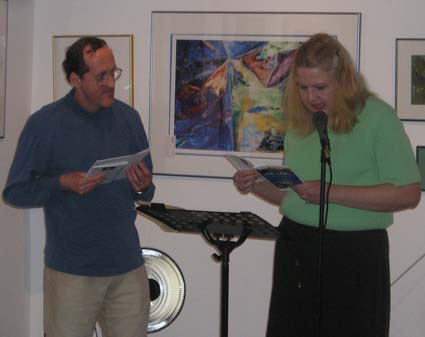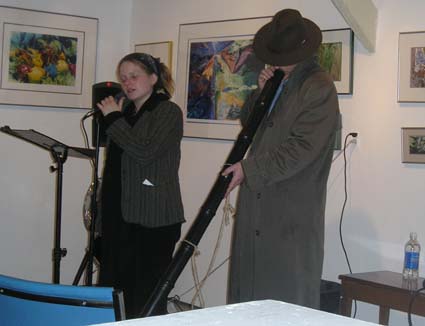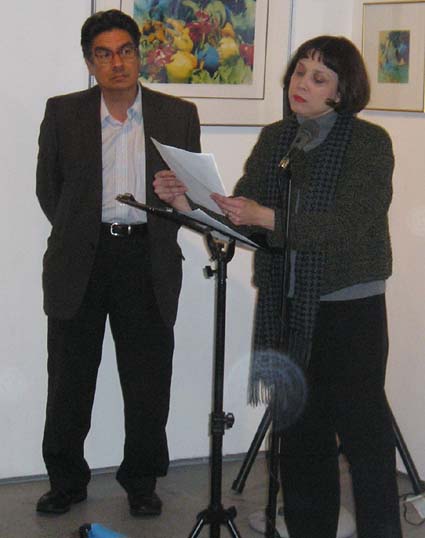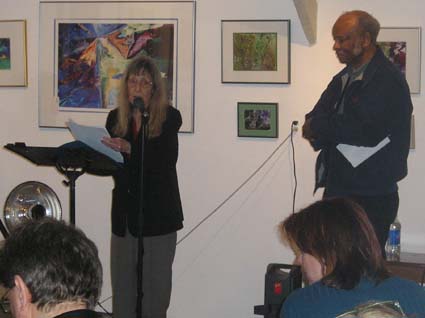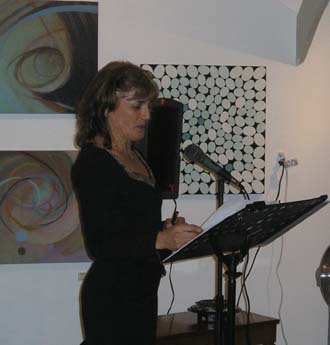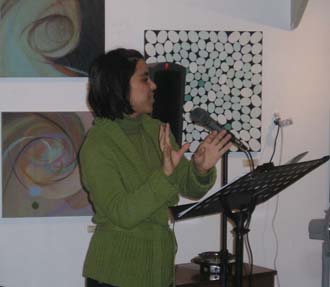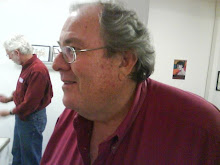In Kate’s first set she read a piece by Edna St. Vincent Millay, then thought that maybe she shouldn’t have picked such a powerhouse poet because her own work might not stand up next to Millay’s. There were several poems in this set that could be described as heartfelt yet depressing. Then after apologizing to the audience for picking so many depressing poems, she proceeded unabashedly to read some of her own (self-labeled) “depressing” poems. One of these was about A neighbor she had in Czechoslovakia whom she did not know but whose presence was reassuring nonetheless. The piece was titled “The Neighbor”[Listen to the .mp3 at this link]. She also read a poem about an experience she had deep sea diving entitled “Dive.”
Julia then read several poems by other poets. One of these was a long, sad, affecting poem by a man named John Robinson. She also read poems by Thomas Centolella and Jorie Graham’s “San Sepolcro” (which by her own admission she wasn’t sure why she read).
It became clear as the reading went on that both poets chose poems that they felt some sort of kinship with, yet their affinity to each piece remained unarticulated. It was almost as if each poem was chosen to penetrate the other’s psyche, the way one might spontaneously ask a penetrating question of a friend that you are getting to know.
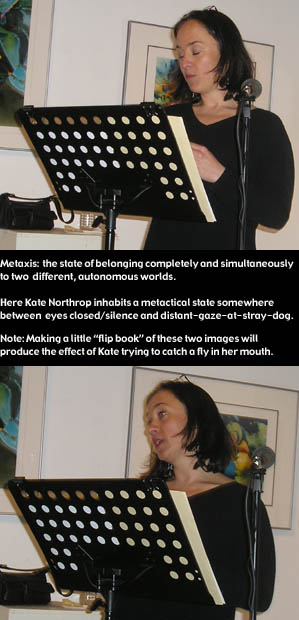
Kate read pieces from the second set, including the title piece from her new book (which did not arrive as had been expected due to a distribution snafu) entitled “Things Are Disappearing Here”. She explained that instead of words like “mist” and “rain” that recurred in her first book, the word she found she was most fond of in the writing of this book was “there.” It was also during this set that she introduced the audience to a new word: metaxis. Northrop described this word as an instance when a thing exists between two states but it is in neither of them. It became clear as the night wore on that the thing that existed between Northrop and Levine, that lived in both of them simultaneously, was their friendship and mutual respect for each other’s craft.
In Julia Levine’s second set she read several pieces. One was inspired by the sonic memorial to 9/11 which catalogs the sounds of last calls made to loved ones made by those on the planes that went down that day.
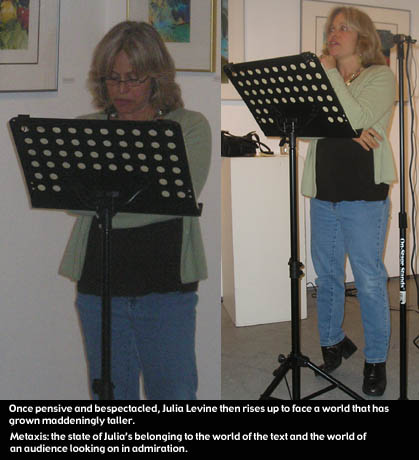
Driving West on 37, Listening to the Sonic Memorial
Why stop ever, days of rain
lifting rust from winter’s sedge,
a taste of unfinished ruin
shuttled and looming
in the storm of swallows
giving back the massive river,
the voice on my radio
unsealing the beyond,
binding it back again.
Jules, this is David. I am on a plane
that’s been taken hostage,
and it doesn’t look good,
a flock of swallows flying now
across the marsh, folding the silver edges
over and over, the great barriers
dissolving up that high
where David whispers, Jules,
I want you to know. I loved you absolutely.
Finally, I think, the smallness
of believing in one body
is all that ever can be undone.
How I hear David’s voice
and want him to live; want Jules
to beg him please, come back,
but of course she isn’t home,
the tiny tape on her counter
turning round his ghost,
a strange whir unloosed and soaring.
As if the promise to return
was an instinct in us, too,
a magnetic field poured
and snowing, the way David does now,
my own face changing shape
to think of how he is hurled into it--
like fledglings pushed from cliffs,
like the ones at the tower’s edge
feeling the floor begin to crumble--
how finally, at the edge of all we know,
they are taking someone’s hand,
they are throwing two bodies
against one sky, one wing......
Another piece was an homage to a particular favorite spot out in Tomales Bay where one climbs to this place of refuge hidden from the shore and is rendered philosophically replenished.
Tomales Bay
We lie down on the dock
and listen to wind fingering the masts,
a kind of chiming you say
that always makes you sad.
A gull slips through the bay,
lifting white and impossible into the sky.
And there, just beyond the cove,
a man and his two small boys
shout wildy, clapping at each mackerel
they drag up over their rowboat's stern.
The water’s surface keeps breaking.
The sky keeps changing colors.
And behind it, behind beauty?
Perhaps we were not meant
to understand everything.
Perhaps it doesn’t matter
how far away the disturbance
travels to reach us,
or how hard the slam and thrust
buried in these waves.
Our bodies are sleeved in light.
And our souls,
they make this trip alone.
At the end of the evening Julia and Kate jumped on a plane and flew to the AWP conference together. There’s no doubt that they’ll be sitting together, which is really nice when one realizes that too many literary relationships are marked with poison.
Oh, and, by the way, thanks, Kate, for teaching us in Sacramento a new word.


